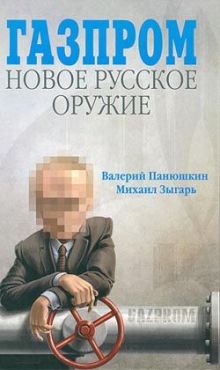If the Ukrainian political leadership paid more attention to contemporary quality literature, they would make a big discovery: all their moves and all those unexpected political and economic situations have long been predicted. A year ago, the Russian journalists Valerii Paniushkin and Mikhail Zigar wrote a book under the eloquent title Gazprom: Russia’s New Weapon. It appeared in print first in German and then in Russian and Ukrainian. This book is extremely topical today, in the light of the recent developments.
One of the authors, Valerii PANIUSHKIN, ranks among the most principled and consistent journalists in Russia, although he says that his views are not popular in his country. As soon as the book hit the shelves (it became a bestseller in Germany), Paniushkin was invited to visit Gazprom.
How does Paniushkin feel about the Ukrainian-Russian gas conflict today? Was it possible to foresee and, most importantly, avoid this crisis in Ukraine-Russia relations?
When working on your book, did you foresee recent events? Why does history repeat itself every year, with neither side willing to change the situation?
“These events remind one of Eldar Ryazanov’s comedy Irony of Fate. His characters went to public baths on every New Year’s Eve, just as Russia cuts off gas supply to Ukraine every year around the same time. Honestly, I don’t understand what point the Russian leadership is trying to make this year. The way I see the situation, Russia is trying to sell the same amount of gas twice. There are certain specific people, we don’t know their names because we don’t know who owns Naftohaz [Ukrainy]. The whole thing is shrouded in mystery and the same is true of RosUkrEnergo. Nothing is known for sure about who the gas intermediaries are.
“Picture yourself as a bootlegger back in the 1930s in the USA. Would you want the dry law abolished? Of course not, because you’re making money on it. Here we have the same situation. All things considered, this situation is advantageous for Putin or people close to him. And so, instead of bringing gas prices into conformity with the oil price, which has dropped, the Russian leadership is trying to rescue Gazprom-this company is in a very uncomfortable financial situation, at the same time trying to bring revenue to the Ukrainian intermediary company.
“Roughly speaking, the Russians are trying to get paid as a state and as a private Ukrainian transit company. I think that trying to get paid twice in the time of economic crisis is an act of gross insolence. Mind you, I’m not portraying the Ukrainian leadership as angels. I think that the Ukrainian side unlawfully siphons off gas. There are two sides and neither is faultless. If the Russian and Ukrainian governments think they can get away with this, they are badly mistaken.”
In other words, you believe that neither the Ukrainian nor the Russian government is interested in Ukraine’s energy independence?
“Private individuals make money on gas issues precisely because they are tied to the political situation. Suppose we (I mean Gazprom) can’t sell gas to Ukraine at European prices, but we need Ukraine as a gas transit country. So we want to have neighborly relations with this brotherly Slavic people. In that case we set the gas price, once and for all, at, for example, 50 percent of the European price. The situation becomes understandable and that’s it. No special intermediaries or crafty negotiations every year. But then the whole corrupt scheme, the sense of the activities of bureaucrats in Russia and Ukraine, will fall apart. In Russia, such systems are tougher and more daring because both the authorities and the media are monopolized.”
One year after the publication of Gazprom: Russia’s New Weapon, do you need to modify or add anything?
“This book contains lots of mysteries that remain unsolved. We don’t know much about how Gazprom operates; This is probably why we are still alive. We will know whether or not this book has to be updated in about a year, when the company’s investment policy becomes clear, when we see if Gazprom can cope with the dropping value of its shares, pay its debts, and develop the natural deposits. Gazprom is receiving a great deal of economic and political support from the state. It is very difficult to figure out the company’s actual condition.”







